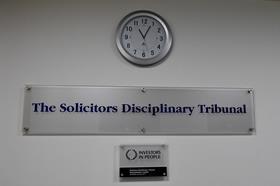Decisions filed recently with the Law Society (which may be subject to appeal)
Jack Grunhut
Application 12488-2023
Admitted 2019
Hearing 12 December 2023
Reasons 18 January 2024
The SDT ordered that the respondent should be struck off the roll. While in practice as a solicitor and in support of an application for a refund of stamp duty and land tax to HMRC in respect of property A, the respondent had drafted and obtained a deed of trust which he knew was false and misleading in that it purported to have been made on 17 June 2019 but had actually been signed on 15 June 2020, thereby breaching paragraph 1.4 of the SRA Code of Conduct for Solicitors, RELs and RFLs 2019, and principles 2, 4 and 5 of the SRA Principles 2019.

In an email to his employer Berlad Graham, the respondent had knowingly provided false and misleading information by stating that he did not have any personal or financial relationships with any clients of the firm which had not been disclosed, in circumstances where he had in fact received two personal loans from clients of the firm which had not been disclosed, thereby breaching paragraph 1.4 of the code and principles 2, 4 and 5.
The respondent had provided false and misleading information to his employer Berlad Graham by confirming in an email that he had not entered into any referral/introducer arrangements in relation to the firm’s clients or matters undertaken at the firm and had not entered into any such arrangements without prior COLP approval, in circumstances where both those statements were untrue and had thereby breached paragraph 1.4 of the code and breached principles 2 and 5.
While employed as a solicitor with Berlad Graham, in relation to the purchase of property H, the respondent had failed to comply with his employer’s anti-money laundering procedures and conduct adequate client due diligence, thereby failing to comply with regulation 28 of the Money Laundering, Terrorist Financing and Transfer of Funds (Information on the Payer) Regulations 2017, and breaching paragraph 7.1 of the SRA Code 2019 and principle 2 of the SRA Principles 2019.
The respondent’s motivation in relation to the first allegation was to help a friend and client. In relation to the second and fourth allegations the motivation had been to conceal matters from his employer. In relation to the sixth allegation, the respondent had essentially taken a shortcut.
The main harm was to the reputation of the profession, which was high. The matters were aggravated by dishonesty. The misconduct had been repeated. It was mitigated by the respondent’s cooperation with the SRA, his previous good character and his admission to the sixth allegation.
The usual sanction where misconduct included dishonesty would be a strike-off. The circumstances in which such a sanction was not imposed were exceptional.
The misconduct had continued over a period of time, the respondent had caused a high level of reputational harm and had risked individual harm by his actions. It had not been an isolated moment of poor judgement but a course of actions that had included dishonesty in different fields of the respondent’s working life. The common theme across the first, second and fourth allegations was a lack of transparency.
[The factual basis of allegation 3 was not proved; allegation 5 was withdrawn].
The SDT was sympathetic to the respondent’s personal circumstances during the period in question, but no link had been established between those matters and the misconduct.
There were no exceptional circumstances in the case and accordingly the only appropriate sanction was that the respondent be struck off the roll.
He was ordered to pay costs of £29,533.
Paul Douglas Hills
Application 12478-2023
Admitted 1990
Hearing 21 November 2023
Reasons 19 December 2023
The SDT ordered that the respondent should be struck off the roll. While in practice as an associate solicitor, and later as a partner, at the firm, on up to six occasions the respondent had retained monies paid to him by clients and had failed to pay those monies into the firm’s client account promptly, thereby failing to account to the firm to whom the monies were due, and breaching principles 2, 4, 6 and 10 of the SRA Principles 2011 and rule 14.1 of the SRA Accounts Rules 2011. He had acted dishonestly.
He had prepared up to 16 applications for grants of probate, administered the oaths himself and on up to eight occasions had retained the oath fees for himself, thereby breaching principles 1, 2, 4, 5 and 6 and failing to achieve outcome 11.4 of the SRA Code of Conduct 2011.
The parties had invited the SDT to deal with the allegations against the respondent in accordance with a statement of agreed facts and outcome.
The SDT had reviewed all the material before it and was satisfied on the balance of probabilities that the respondent’s admissions had been properly made.
The present case was a serious one of dishonest conduct on multiple occasions. No exceptional circumstances had been advanced and the SDT had been unable to identify any. The medical evidence provided was well short of what would have been required to amount to exceptional circumstances.
The only appropriate sanction that would protect the public and the reputation of the profession from future harm was that the respondent be struck off the roll.
The respondent was ordered to pay costs of £15,000.






























